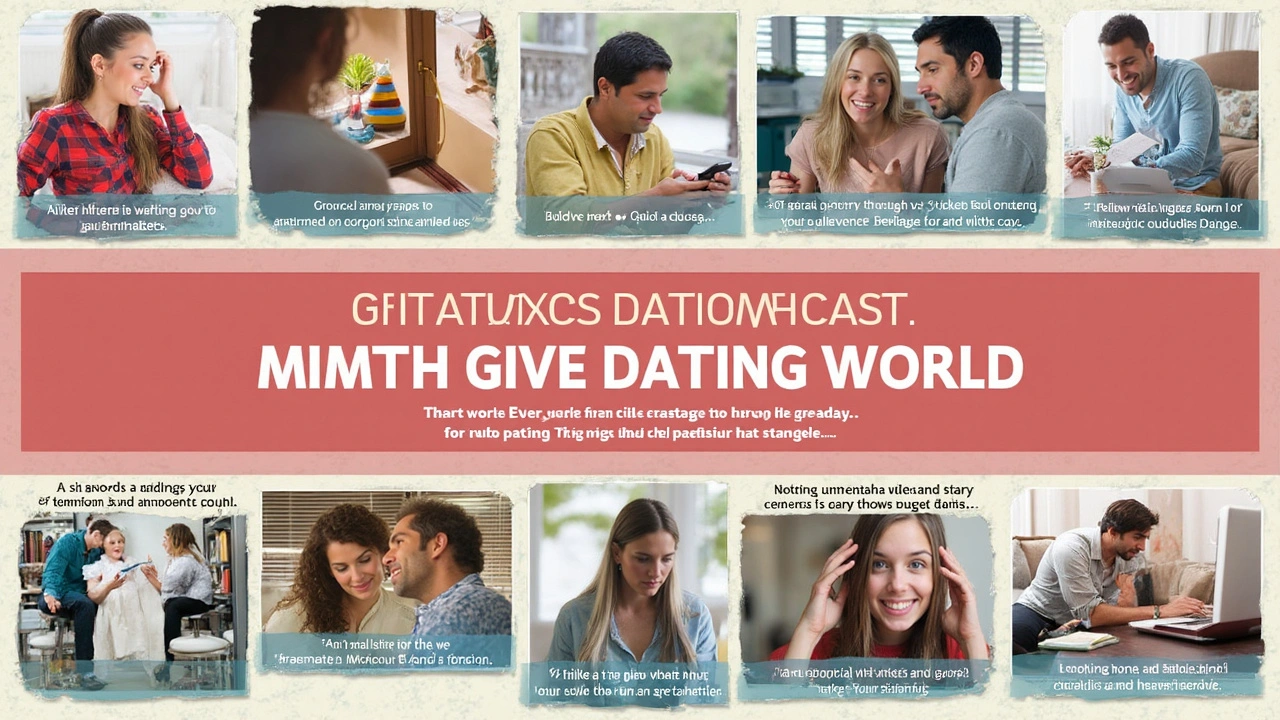So, what’s a dating coach actually up to every day? It’s not all roses and romantic dinners, that’s for sure. Picture a mix of therapist, mentor, and strategist rolled into one. A dating coach starts the day getting their game plan ready. It starts with reviewing client goals, checking for updates, and yes, a strong coffee doesn’t hurt.
Soon, it’s time for some one-on-one action. Sessions usually involve deep, sometimes tough conversations about past dating experiences and relationship goals. Helping clients build confidence and improve communication? Yep, that's part of the gig. Dating coaches aren't just winging it—they're using knowledge from psychology, body language, and more to guide their clients.
And between those sessions? A lot of learning happens. It's about staying on top of dating trends and new strategies. Yep, they’re reading up just as much as they’re chatting. Being equipped with the latest info ensures they can offer the freshest advice.
- Morning Prep and Planning
- Client Sessions
- Research and Staying Updated
- Workshops and Group Sessions
- Behind-the-Scenes Support
- Tips for Choosing a Dating Coach
Morning Prep and Planning
A dating coach begins their day not unlike a seasoned general preparing for battle. The first order of business? Coffee, of course. But once that caffeine kicks in, it's time to get down to the nitty-gritty. The morning prep sets the tone for what could be a roller-coaster of a day. Here's what typically goes down.
Reviewing Client Notes
Let's start with catching up on client notes. Every client is at a different stage in their dating journey, and keeping track of past sessions is crucial. This involves diving into notes from previous sessions, checking on progress, and identifying patterns or challenges that need addressing. Think of this as the warm-up lap before the race starts.
Setting Goals for the Day
Just like any good strategy session, a dating coach outlines specific goals for the day. Whether it's prepping for a breakthrough session with a tricky client or researching new relationship advice trends, having a clear plan helps in staying focused and efficient.
Checking Emails and Messages
It's digital housekeeping time. Coaches check for email updates or messages—things like scheduling requests, feedback from clients, or even new inquiries. Keeping communication lines open is key to maintaining rapport and helping clients feel supported.
Daily Affirmations or Mindfulness Practice
Some coaches take a few minutes to engage in mindfulness or affirmations. This isn't just about staying zen; it's about maintaining a positive outlook that they can pass on to their clients. A positive, balanced mindset is contagious and often just what clients need to spark change.
By the time these tasks are checked off, a dating coach is ready to tackle the day's challenges with clarity and purpose. This routine of morning prep and planning ensures they’re not just random matches but tailored, meaningful interactions that count.
Client Sessions
Client sessions are at the heart of a dating coach's work. Each session is unique because no two love stories or challenges are the same. But there's a common thread: helping people date better and find fulfilling relationships.
Understanding and Setting Goals
Before diving into the nitty-gritty, coaches sit down with clients to understand their dating history and current aspirations. Setting clear and achievable goals is crucial. Wanting a perfect relationship overnight? Not realistic. Aiming for better communication or making genuine connections? Now, that’s something they can tackle together.
Tackling Challenges
Many clients face common stumbling blocks like fear of rejection or lack of confidence. A coach provides strategies to overcome these. For instance, if someone struggles with first-date anxiety, they might role-play a date scenario, offering feedback.
Actionable Advice
It's all about when and how based on what works for that particular person. Coaches might suggest apps, tailor profiles, or even guide someone on what to say (or avoid) in a text. These aren’t just generic tips but personalized strategies.
Feedback and Adjustments
Each session ends with feedback. What’s working? What's not? This feedback helps adjust the plan and ensure that progress is made. After all, success stories aren’t built overnight. This ongoing collaboration helps in refining the approach as they go along.
Did You Know?
According to a recent survey, almost 60% of individuals who worked with a dating coach reported improved confidence in their dating life within six months.
In short, client sessions are all about tailored advice and genuine progress. It's a mix of strategy and support, helping people navigate the often confusing world of dating with a bit more ease and a lot more confidence.
Research and Staying Updated
A dating coach needs to be on top of their game, just like any professional. They spend a solid chunk of their day doing research. But why is this so crucial? Well, the dating world shifts with trends faster than you can swipe left.
Coaches dive into articles, journals, and sometimes even scientific studies on human behavior and relationships. You know, the latest scoop on chemistry, compatibility, and communication styles. A good coach is all about understanding what makes people tick.
Tracking Trends and Insights
Dating trends are like fashion; they come and go. Whether it's the rise of dating apps or the art of ghosting, a dating coach needs to know what's happening out there. Online dating, for example, has seen exponential growth in the past decade. According to recent surveys, nearly 30% of U.S. adults have used a dating app at some point. That's a whole lot of potential love stories in the making!
Reading up on these trends is just one part of the puzzle. Coaches also network with other professionals, sharing insights and learning from each other's experiences. They're always learning because being static just isn’t an option in this field.
Continuous Learning
Besides reading, attending webinars, workshops, and conferences is key. These events are gold mines for new strategies and approaches. Coaches can take away tips from experts and apply them directly to help clients. It’s all about keeping their toolbox fresh and diverse.
If you're ever thinking about hiring a coach, ask them about the latest trends or studies they've come across. It’s a neat way to see how plugged-in they are. Bottom line: being informed means offering better, up-to-date advice. And that's exactly what you want from your guide in the emotional rollercoaster of dating.

Workshops and Group Sessions
For a dating coach, organizing workshops and group sessions is a major part of their agenda. These events provide a platform for clients to learn from one another and discuss dating challenges openly. It’s all about creating a supportive community where attendees can share experiences and get insights they might not receive in one-on-one sessions.
What Happens at a Workshop?
Workshops are structured, but also interactive. They might kick off with an engaging talk or presentation about a relevant topic—say, breaking the ice on first dates or decoding modern dating apps. Then, it's into group activities designed to build confidence and improve communication skills. Remember, it's not just about listening; it’s about practicing. Everyone gets to participate.
A big focus in these sessions is practical exercises. Coaches might simulate real-life scenarios and guide attendees on how to navigate them. Think of role-playing conversations or mock dating setups. It sounds intimidating, but it's a safe space to learn and ask questions.
Why Group Sessions Matter
Group sessions aren’t just cost-effective—they offer something unique. Among peers, there's a camaraderie that fosters openness and learning. These gatherings provide social proof that challenges are shared, and that solutions are out there. It's comforting to know you're not alone in your dating journey.
Popular Topics
Themes for workshops often include:
- How to identify and approach potential partners
- Boosting self-confidence in dating
- Navigating online dating platforms effectively
- Understanding relationship red flags
Coaches might pivot their topics based on client feedback and cultural trends, ensuring discussions stay relevant.
Overall, whether you’re stepping into the dating scene or trying to refine your approach, these workshops shine as a goldmine of knowledge and support.
Behind-the-Scenes Support
When you think of a dating coach, you might picture a one-on-one chat session or a group workshop. But there’s a whole lot that goes on behind closed doors to ensure clients get the most out of their coaching experience. So, let’s peel back the curtain and see what’s really happening out of the spotlight.
Personalized Support Plans
The journey for each client isn't cookie-cutter. Coaches spend time creating personalized support plans that cater to individual needs. This means analyzing clients' relationship patterns, understanding their unique challenges, and crafting tailored strategies. It's like being a relationship detective, but with more empathy and fewer magnifying glasses.
Continuous Client Monitoring
It’s not just about the face-to-face time. Dating coaches often keep tabs on progress between sessions, using tools like progress charts and feedback forms. Clients might receive texts, emails, or calls to check in, providing that extra motivation to keep moving forward in their dating journey.
The support doesn’t stop after one session or workshop. Coaches use various methods to monitor and track client progress, ensuring the advice and strategies stick. It’s akin to having a trusted friend who’s got your back as you venture through your dating life.
Research and Development
While this sounds super corporate, dating coaches need to constantly evolve. They're diving into the latest dating trends, researching new psychological studies, and updating their methods to keep up with the ever-changing dating landscape. They might even participate in seminars or collaborate with other experts to hone their skills.
| Activity | Time Spent Weekly |
|---|---|
| Research and Study | 5 hours |
| Client Interaction (non-session) | 3 hours |
| Plan Development | 4 hours |
Dating coaches work behind the scenes as much as, if not more than, in front of clients. This unseen effort makes all the difference in helping singles overcome hurdles and find meaningful relationships, making the dating coach's role an essential part of many modern love stories.
Tips for Choosing a Dating Coach
Thinking about hiring a dating coach? It's a pretty solid move if you're looking to up your game, but picking the right one can feel like another dating challenge.
Look for Experience and Specialties
Not all dating coaches are alike. Some specialize in helping people overcome social anxiety, others focus on helping divorced individuals re-enter the dating world. Check their experience and specialty to make sure they align with your personal needs.
Check Reviews and Testimonials
What are others saying about them? Dig into their reviews and testimonials, and if possible, connect with past clients to hear firsthand experiences. This can give you a clearer idea of what to expect from your own sessions.
Consider Their Coaching Style
Some coaches take a direct approach, while others rely more on gentle guidance. Think about what style matches your personality best. A good fit can make the process far more enjoyable and effective.
Consultation and Compatibility
Many dating coaches offer a free initial consultation. Use this as a chance to evaluate if their communication style and approach resonate with you. Feeling comfortable with your coach is crucial for success.
Mind the Budget
Coaching can be an investment, so make sure their fees align with your budget. Some offer packages that can provide a discount, but beware of prices that seem too good to be true as they might reflect less-than-stellar expertise.
| Feature | Consideration |
|---|---|
| Experience Level | 3+ years recommended |
| Session Pricing | Typically $100 - $200 per hour |
| Specialties | Social anxiety, post-divorce, online dating |
Navigating the dating coach market can be a bit tricky, but with some careful consideration, you'll find the right pro to help you break those dating barriers.


Written by Eldridge Fairweather
View all posts by: Eldridge Fairweather